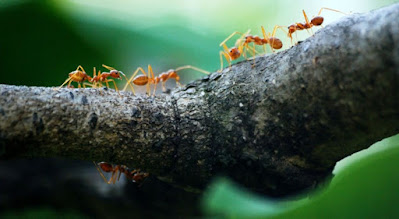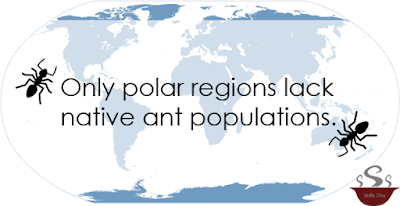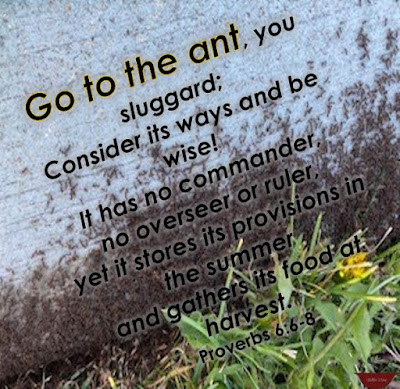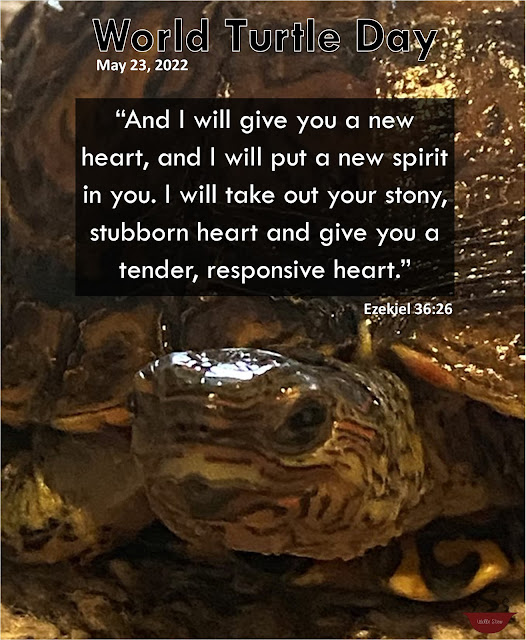Go to the Ant
Ants. What do you
know about them? Do they intrigue
you? Or does just the sight of them make
your skin crawl?
 |
| Photo by Pranimm Athithawatthe via Pexels |
I know I’ve had my run-ins with them. They’ve invaded our house, more specifically
our dishwasher. They’ve turned periods
of relaxation into bouts of panic by climbing on or near my vicinity. They’ve frustrated me with their persistence
in establishing and reestablishing residence. And they’ve fascinated me by moving in
circular motions prior to an oncoming storm. My feelings of ants tilt toward the side of annoyance.
But King Solomon was clearly fascinated by them. In Proverbs 6:6-8 King Solomon writes:
The fact Solomon knew these details regarding ants caused Mark W. Moffett, author of Adventures Among Ants: A
Global Safari with a Cast of Trillions, to weigh in asserting, “King Solomon must
have been a devoted ant observer to reach this conclusion.” Why would a king,
known for his wisdom (I Kings 3:28, II Chronicles 9:5-8), care about the behavior of ants, and
moreover suggest we should likewise?
This blog, and several to follow, seeks to explore these
questions. We’ll walk through the verse step by step and perhaps, by the end,
gain some glimmer of understanding into why, we humans – God’s dearly beloved –
should take the time to consider, well, a persistently pesky insect that dines
on our discarded food and the decaying dead.
Here's an outline of the upcoming blogs and questions they’ll seek to answer:
- “Go to the Ant” Why an ant?
- “An Ant’s Ways” What are the ways of an ant?
- “Gaining Wisdom from Ants” What wisdom might I, a sluggard, gain from an ant? (Links to the first of several wisdom from ants posts)
- “The Freedom of Ants” Though free, what motivates an ant to continue working, and would I?
So, in continuing to read, you accept the fact that I will
not get through the entire ant-alysis of this verse today. The focus of this post, the one currently before you is: “Why an ant?” I'll begin with a broad investigation and narrow to why the ant specifically. Here's a breakdown of the subtopics covered (jump to the area of most interest to you, or read straight through):
Props in Nature
An ant, undeniably, is part of nature. The Bible consistently utilizes nature comparisons to aid the reader’s understanding. Consider the following examples:
 |
| Photo from Pixabay |
 |
| Photo from Josua Lanzarini via Unsplash |
 |
| Photo from pxfuel |
 |
| Photo from pxfuel |
John 10:14-15 parallels the relationship of a shepherd and its sheep to Jesus and his followers.
These connections give us a common reference point: both God
and humans relate to nature. We live in it; He created it. By relating a new idea to something familiar,
we are more likely to grasp the concept. It’s why teachers connect learning to
food, video games, sports, and popular entertainment. Connecting new learning
to preexisting knowledge is simply excellent pedagogy. In scientific terms, it builds neural
connections and long-term memory storage, thereby making learning more
effective (Bernard
2010). From a scientific, pedagogical perspective, King Solomon leads us to the
ant because of best-teaching practices. And I believe, if you're observant, God continues to talk to us through nature.
Connecting Creation to Wisdom
But, why use nature as the connection? Might it be because Wisdom was there when God
made creation (Proverbs 8:22-31). And,
as Wisdom observed, she noticed the beauty, the complexity, the meaning, and
delighted in all of it. Perhaps Wisdom sees
Christ in the grape vine and us in the branches, observes faith nestled in every
mustard seed, envisions righteousness springing forth from sown seeds, visualizes
Christ as a shepherd and us as His sheep, witnesses the provision of God for
the birds and the flowers projecting into an overabundance of riches for us, and perhaps Wisdom perceives an ant as the object of instruction to a sluggard.
From observing elements of creation, Wisdom is found. Even a basic definition of science
encompasses an observation of nature (Science Definition,
2006-2019). It’s evident: humans, in our
search for knowledge, are drawn to observe nature. And Wisdom, an
observer of creation, holds insight for us in the secrets of nature - should
we seek to also study the lessons of righteousness.
But Why the Ant, Specifically?
Sure, they are hard-working, but what about one of these other animals touted as workaholics by Animal Planet? Like the bee, who not
only has specified roles, but also makes honey, which is prized by humans. Or what about the beaver, who after it spends
countless hours gnawing down trees, biting them to size, carrying them to their
home, and masterfully crafting the home, must then also chew out the living
quarters. Or the cleaner wrasse, who
works all day every day to clean parasites off fish of the coral reef? Why not one of the other hard-working
animals?
Perhaps it’s because ants are everywhere. True, ant species vary by place, but if you
were to observe an ant, you would not need to travel far. A quick glance at Ant Maps reveals only polar regions lack
native ant populations. And, not too many people live in these regions either.
 |
| This photo licensed under CC BY-SA |
And, if we want to be honest, ants are fun to watch. When I
told my nephew that ants were the topic of my next post, he wanted to make sure
I included this fact: people love to watch them. That’s why ant farms, an invention that
emerged in 1956, remain popular today (Hevesi,
2011).
 |
| This photo licensed under CC BY-NC-ND |
But, most importantly, in God choosing ants specifically, I think it's another opportunity for
God to teach us humility. God, whose son, amid a triumphal march, rode on a lowly donkey. God, who chose a stutterer to
be the spokesman that lead His people out of Egypt. God, who dined at the
house of outcasts and healed the untouchable. That God wants us to see that an ant - yes, the very same one who
dines on your crumbs - has a lesson of value to teach you.
Just what is that lesson, you ask? Well, for my answer to that, you’ll just have
to wait until next time, dear reader. Until then, I encourage you to spend time in nature. Observe. Notice the small things, the large things. Take it all in. Feel the connection. In awe, recognize God created it all. Everything around you, God spoke into
existence.
Next, find one moment, one object, that speaks to you. Hold on to it. Keep it in your head. On the way home, ponder it. Replay it. Let it settle into your soul.
When you reach home, find a Bible verse that connects with
that moment. Dig in to the verse. Break
it down word by word. Connect it with your experience. How is the Holy Spirit speaking to you using
that moment in nature and God’s holy word? What wisdom is there to gain?
If you’d care to share your moment, we’d love to hear about
it. Email us (mr@wolfestew.com or mrs@wolfestew.com), send us a message on
social media, (Twitter, Facebook, or Instagram) or comment below.
Before You Go
We’d Love to Know:
- What observations have you made regarding ants?
- Where else in the Bible is nature used to teach a lesson?
With Love and Prayers from the Kitchen,
Interested in more faith-related blogs? Then you're looking for Faith Food. At Faith Food, you'll find links to all our faith-related blogs and a short description of each.
References
- Bernard, Sara. “Science Shows Making Lessons Relevant Really Matters,” 1 Dec. 2010 Edutopia. https://www.edutopia.org/neuroscience-brain-based-learning-relevance-improves-engagement Accessed 7 May 2020.
- Hevesi, Dennis. “Milton M. Levine, Inventor of Ant Farm, Dies at 97.” The New York Times 29 Jan. 2011, www.nytimes.com/2011/01/30/business/30levine.html Accessed 14 May 2020.
- Moffett, Mark W. Adventures Among Ants: A Global Safari with a Cast of Trillions. University of California Press, 2020, Berkeley, California.







Comments
Post a Comment
Thank you for adding your flavor to the stew.